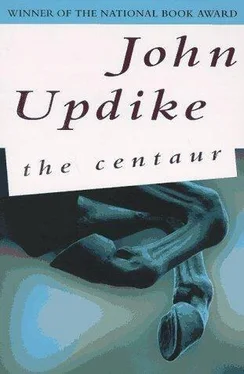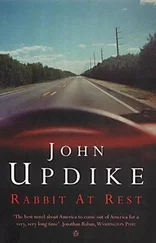John Updike - The Centaurus
Здесь есть возможность читать онлайн «John Updike - The Centaurus» весь текст электронной книги совершенно бесплатно (целиком полную версию без сокращений). В некоторых случаях можно слушать аудио, скачать через торрент в формате fb2 и присутствует краткое содержание. Жанр: Триллер, на английском языке. Описание произведения, (предисловие) а так же отзывы посетителей доступны на портале библиотеки ЛибКат.
- Название:The Centaurus
- Автор:
- Жанр:
- Год:неизвестен
- ISBN:нет данных
- Рейтинг книги:3 / 5. Голосов: 1
-
Избранное:Добавить в избранное
- Отзывы:
-
Ваша оценка:
- 60
- 1
- 2
- 3
- 4
- 5
The Centaurus: краткое содержание, описание и аннотация
Предлагаем к чтению аннотацию, описание, краткое содержание или предисловие (зависит от того, что написал сам автор книги «The Centaurus»). Если вы не нашли необходимую информацию о книге — напишите в комментариях, мы постараемся отыскать её.
In a small Pennsylvania town in the late 1940s, schoolteacher George Caldwell yearns to find some meaning in his life. Alone with his teenage son for three days in a blizzard, Caldwell sees his son grow and change as he himself begins to lost touch with his life. Interwoven with the myth of Chiron, the noblest centaur, and his own relationship to Prometheus, The Centaur one of John Updike's most brilliant and unusual novels.
The Centaurus — читать онлайн бесплатно полную книгу (весь текст) целиком
Ниже представлен текст книги, разбитый по страницам. Система сохранения места последней прочитанной страницы, позволяет с удобством читать онлайн бесплатно книгу «The Centaurus», без необходимости каждый раз заново искать на чём Вы остановились. Поставьте закладку, и сможете в любой момент перейти на страницу, на которой закончили чтение.
Интервал:
Закладка:
As we drove home, the days since I had last seen this road sealed shut like a neat scar. Here was the crest of Cough-drop Hill, here was the curve and clay embankment where we had picked up the hitchhiker, here was the Clover Leaf Dairy where conveyor belts removed the cow dung and all the silver chimneys on the barn roof were smoking against the salmon flush of the sky; here was the straightaway where we had once killed a confused oriole, here was Galilee and, beside the site of the old Seven-Mile Inn, Potteiger’s Store, where we stopped for food. Item by item, as if he were a druggist filling a prescription, my father went around the shelves gathering bread and sliced peaches and Ritz crackers and Shredded Wheat, piling them up on the counter in front of Charlie Potteiger, who had been a farmer and had come back from the Pacific to sell his farm to developers and set up this store. He kept our debt in a little brown five-cent note book and, though it ran as high as sixty dollars between pay-days, never forgave us so much as an odd penny. “And a loop of that pork sausage my father-in-law loves so much and a half-pound of Lebanon baloney for the kid to nibble,” my father told him. An extravagance had entered his shopping, which was customarily niggardly, a day’s food at a time, as if the next day there might be fewer mouths to feed. He even bought a bunch of fresh bananas. As Potteiger with his pencil stub effortfully toted up the bill my father looked at me and asked, “Did you get a soft drink?”
I usually did, as a last sip of civilization before we descended into that rural darkness that by some mistake had become our home. “No,” I told him. “I have no appetite. Let’s go.”
“This poor son of mine,” my father announced loudly to the little pack of loafers in red hunting caps who even on this day of storm had showed up to stand around and chew in here, “he hasn’t been home for two nights and he wants to see his mamma.”
Furious, I pushed through the door into the air. The lake across the road, rimmed in snow, looked black as the back of a mirror. It was that twilight in which some cars have turned on their headlights, some their parking lights, and some no lights at all. My father drove as fast as if the road were bare. In some parts the road had been scraped clean and on these patches our chains changed tune. Halfway up Fire Hill (above us, the church and its tiny cross were inked onto an indigo sky), a link snapped. It racketed against the rear right fender for the remaining mile. The few houses of Firetown patched the dusk with downstairs windows glowing dimly as embers. The Ten Mile Inn was dark and boarded shut.
Our road had not been plowed. Our road was actually two roads, one which went in through the Amish fields and another which led off from that, down past our property, to rejoin the highway by Silas Schoelkopfs pond and barn. We had left by this, the lower road; we returned by the upper. My father rammed the Buick through the heaped snow and it sagged to a stop perhaps ten feet off the highway. The motor stalled. He turned off the ignition and snapped off the lights. “How will we get out tomorrow?” I asked.
“One thing at a time,” he said. “I want to get you home. Can you walk it?”
“What else can I do?”
The unplowed road showed as a long stretch of shimmering gray set in perspective by two scribbled lines of young trees. Not a houselight showed from here. Above us, in a sky still too bright a blue to support stars, sparse pale clouds like giant flakes of marble drifted westward so stilly their motion seemed lent by the earth’s revolution. The snow overwhelmed my ankles and inundated my shoes. I tried to walk in my father’s footsteps but his strides were too great. As the sound of traffic on the highway faded behind us, a powerful silence strengthened. There was a star before us, one, low in the sky and so brilliant its white light seemed warm.
I asked my father, “What’s that star?”
“Venus.”
“Is it always the first to come out?”
“No. Sometimes it’s the last to go. Sometimes when I get up the sun is coming up through the woods and Venus is still hanging over the Amishman’s hill.”
“Can you steer by it?”
“I don’t know. I’ve never tried. It’s an interesting question.”
I told him, “I can never find the North Star. I always expect it to be bigger than it is.”
“That’s right. I don’t know why the hell they made it so small.”
His shape before me was made less human by the bag of groceries he was carrying and it seemed, my legs having ceased to convey the sensations of walking, that his was the shape of the neck and head of a horse I was riding. I looked straight up and the cobalt dome was swept clean of marble flakes and a few faint stars were wearing through. The branches of the young trees we walked between fell away to disclose the long low hump, sullenly lustrous, of our upper field.
“Peter?”
My father’s voice startled me, I felt so alone. “What?”
“Nothing. I just wanted to make sure you were still behind me.”
“Well where else would I be?”
“You got me there.”
“Shall I carry the bag for a while?”
“No, it’s clumsy but it’s not heavy.”
“Why’d you buy all those bananas if you knew we were going to have to lug everything half a mile?”
“Insanity,” he answered. “Hereditary insanity.” It was a favorite concept of his.
Lady, hearing our voices, began to bark behind the field. The quick dim doublets of sound like butterflies winged toward us close to the earth, skimming the feathery crust rather than risking a plunge upward into the steep smooth dome that capped a space of Pennsylvania a hundred miles wide. From the spot where the lower road led off from the upper we could see on a clear day to the first blue beginnings of the Alleghenies. We walked downward into the shelter of our hillside. The trees of our orchard came first into view, then our barn, and through the crotches and tangled barren branches of the orchard our house. Our downstairs light was on, yet as we moved across the silent yard I became convinced that the light was an illusion, that the people inside had died and left the light burning. My father beside me moaned, “Jesus I know Pop’s tumbled down those damn stairs.”
But footsteps had beaten a path around the corner of the house ahead of us, and on the porch there were plentiful signs that the pump had been used. Lady, free, raced out of the darkness with the whir of a growl in her throat and then, recognizing us, leaped like a fish from the splashing snow, jabbing her muzzle at our faces, her throat stuck fast on a weak agonized note of whimpering love. She battered and bustled through the double kitchen door with us and in the warm indoors released an unmistakable tang of skunk.
Here was the kitchen, honey-colored, lit; here were the two clocks, the red electric thrown all out of right time by the power failure but running gamely nevertheless; here was my mother, coming forward with large arms and a happy girlish face to take the bundle from my father and welcome us home. “My heroes,” she said.
My father explained, “I tried to call you this morning, Cassie, but the lines were down. Have you had a rough time? There’s an Italian sandwich in the bag.”
“We’ve had a won derful time,” my mother said. “Dad’s been sawing wood and this evening I made some of that dried-beef soup with apples Grammy used to make when we ran out of food.” An ambrosial smell of warm apples did breathe from the stove, and a fire was dancing in the fireplace.
“Huh?” It seemed to daze my father that the world had gone on without him. “Pop’s O. K.? Where in hell is he?”
Even as he spoke he walked into the other room and there, sitting in his accustomed place on the sofa, was my grandfather, his shapely hands folded across his chest, his little worn Bible, shut, balanced on one knee.
Читать дальшеИнтервал:
Закладка:
Похожие книги на «The Centaurus»
Представляем Вашему вниманию похожие книги на «The Centaurus» списком для выбора. Мы отобрали схожую по названию и смыслу литературу в надежде предоставить читателям больше вариантов отыскать новые, интересные, ещё непрочитанные произведения.
Обсуждение, отзывы о книге «The Centaurus» и просто собственные мнения читателей. Оставьте ваши комментарии, напишите, что Вы думаете о произведении, его смысле или главных героях. Укажите что конкретно понравилось, а что нет, и почему Вы так считаете.












